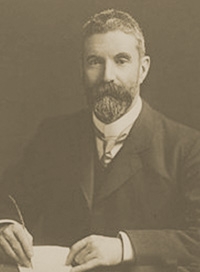Minister officially opens Alfred Deakin Research Institute and Alfred Deakin Prime Ministerial Library
Research news
Minister officially opens Alfred Deakin Research Institute and Alfred Deakin Prime Ministerial Library
Deakin University’s Alfred Deakin Research Institute and Alfred Deakin Prime Ministerial Library were officially opened by the Minister for Regional Australia, Regional Development, Local Government and Minister for the Arts the Honourable Simon Crean today (Tuesday, March 29).
The opening, by Mr Crean, is a milestone for Deakin University and the Geelong Region.
The Vice-Chancellor of Deakin University, Professor Jane den Hollander, said the opening was the culmination of three years work by Deakin University to develop a research Institute and establish a community-facing Alfred Deakin Prime Ministerial Library which is a fitting tribute to the work of Alfred Deakin.
“Alfred Deakin was Australia’s first key architect behind Australia's Federation, three-time Australian Prime Minister and outstanding politician in the first 10 years of the Commonwealth of Australia, 1901-10,” she said.
“In the job of Prime Minister, Deakin was driven. He possessed an impressive oratory style, vital in those early days of Federation. He was known to have had a broad vision with an eye for detail. It sounds like he would have made a perfect Vice-Chancellor!
“Like Alfred Deakin, Deakin University aims to be a catalyst for positive change for the individuals and the communities it serves.’’
A special republished biography of Alfred Deakin written by Professor John La Nauze was also launched.
Director of the Institute, Professor David Lowe, said the Institute pursued research that aimed to inform public debate and public policy – in local, regional and international settings.
“The centre’s research activities can broadly be broken into three themes - leadership, development and governance, and the interconnections between these themes,” Professor Lowe said.
“In line with this, last year we held our first Fusion Lecture which featured Oxford Economist and author of the Bottom Billion, Paul Collier, who put forward a thought-provoking plan for how developing countries can manage their natural resources to improve the wellbeing of their populations.
“This year’s Fusion lecture on Tuesday, April 19 will take a different theme and feature Professor of International History at Cambridge University and a Fellow of Christ’s College, David Reynolds.
“Professor Reynolds is one of the world's leading experts on twentieth century world history and will offer some topical reflections in time for Anzac Day on how the two world wars have shaped Australia's sense of meaning of the 20th century.
“This lecture reflects work by the centre’s own researchers including Professor Marian Simms and myself into aspects of Australian history and politics. My own research, for instance, centres on two projects: one is the phenomenon of public diplomacy as a factor in Australia’s overseas relations; and the other looks at Australian politicians’ use of history. Professor Simms publishes on the subject of women and leadership and Australian electoral behaviour.”
Professor Lowe said a number of researchers in the centre were investigating aspects of sustainability, policy and planning.
“Dr Santosh Jatrana, Senior Research Fellow, is a social demographer whose work explores challenging policy issues around socioeconomic inequality and mortality, child health, gender, demography of ethnic minorities, and migrant health. She is embarking on a major project assessing relationships between immigrants and health in Australia.”
“From another perspective, our new Principal Research Fellow in Social Science, Associate Professor Peter Kelly, has just published a book Smashed! The many meanings of intoxication and drunkenness co-authored with Deakin academics Associate Professors Chris Hickey and Lyn Harrison which explores the lack of shared understanding of drunkenness and intoxication and the impact this could have on initiatives to tackle them.
The Institute has a strong focus on regional research, he said. “Associate Professor Kevin O’Toole, is leading several projects looking at sustainability and governance in rural and regional areas of Australia while Dr Tanya King is part of a research team examining social attitudes to water desalination. With regional partners and in partnership with other institutes, the team is building a centre for expertise in regional research and information.”
Professor Lowe said the centre was also active on international development issues, an area led by former AusAid chief economist, Professor Mark McGillivray.
Professor McGillivray travelled to Dakar earlier this year for the Seminar on Global Governance.
“Professor McGillivray is leading a team which is examining the vexed issue of international aid, international development and wellbeing,” Professor Lowe said. “Is life getting better or worse for the different populations who receive aid and is it being distributed to the right countries.”
Professor Lowe said the Institute was taking a deep interest in events in the Pacific region.
“Perhaps more than ever, the Pacific region is becoming prominent in world affairs,” he said. “The impact of climate change will see population movements ahead of many other parts of the world, and the political and economic fallout of this alone will have effects on the affairs of all countries in the region, including Australia. The Pacific is also tracking least well in progress towards several of the UN’s millennium development goals which are supposed to be achieved by 2015.
“Dr Jon Ritchie, an expert on Papua New Guinea, is currently working on a biography of Papua New
Guinean politician and nationalist the late Sir Ebia Olewale.
“We are also seeking to expand our work on the decolonisation of Melanesia, the impacts which flowed from this, the lessons which can be learned. “These findings can be incorporated into Australia’s policy for the region.”
Share this story

